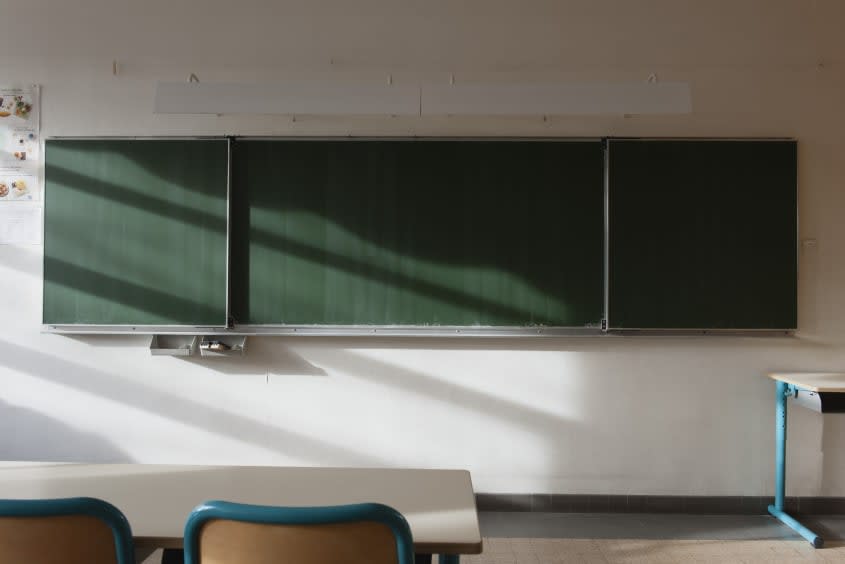Florida educators face off with state officials over a teacher shortage

- Oops!Something went wrong.Please try again later.
A new school year has arrived, and yet the nationwide teacher shortage — which first cropped up early in the Covid-19 pandemic — persists. To that end, the issue has come under increased scrutiny in Florida, where headline after headline has telegraphed the lack of educators, as well as disagreement between the Florida Education Association and the state's Department of Education over whether such a problem exists. If you ask the teachers union, the teacher shortage is everpresent and worsening. But if you ask the governor's office or reference the DOE numbers, Florida is dealing with no such thing. What's going on?
How bad is the alleged shortage?
As of Aug. 10, the Florida Education Association had counted about 7,000 teaching vacancies — up roughly 1,000 from last year— and 5,000 support staff vacancies across the state. "Florida is dealing with, if not the worst, one of the worst teacher shortage situations in the nation," Andrew Spar, president of the FEA, told Tampa Bay's Fox 13 last month. Meanwhile, however, the state's Department of Education claimed on Aug. 15 that there had been an 8% drop in vacancies year-over-year, which it said went from 5,208 to 4,776 between the start of the 2023-2024 and 2022-2023 school years.
Tuan Nguyen, a Kansas State University professor who studies the teacher labor market, told the Orlando Sentinel that the differing data is likely due in part to the timing of each count.
What is behind an apparent shortage?
Spar attributes the chaos to both outside politics and poor teacher pay, he told Fox 13. "While beginning teacher pay has improved significantly over the last few years, you can't bring people in and not continue to allow for growth in pay because they will leave. And that's what we're seeing," he told the outlet. As of at least April of 2023, Florida was ranked 48th in the nation in teacher pay, CBS News reported per an analysis from the National Education Association.
And in regard to politics, Spar told Axios Miami that state educators are feeling hopeless after Gov. Ron DeSantis (R) passed a myriad of state laws limiting what can and can't be discussed in classrooms and schools. Teachers are asking, "Are these books allowed? Can I get books that my kids will relate to? Is my teaching permitted? What if a parent complains?" he said. Added United Teachers of Dade president Karla Hernandez-Mats: "There is enthusiasm but there is apprehension and confusion."
What laws are teachers up in arms about?
Well, there is the controversial Parental Rights in Education Act, or "Don't Say Gay" bill, which has now been expanded to prohibit the discussion of sexual orientation or gender identity in classrooms from kindergarten through eighth grade. The law also restricts reproductive health education through 12th grade, prohibits schools from requiring that students and employees refer to one another with their preferred pronouns, should they differ from those they were assigned at birth, and bars trans employees from sharing their preferred pronouns with students.
In 2021, the Florida Board of Education banned the education of concepts related to "critical race theory." In 2022, DeSantis signed the so-called Stop WOKE Act, intended to further restrict how racism can be taught in schools and by employers. Among other provisions, the law "prohibits instruction that could make students feel responsibility for or guilt about the past actions of other members of their race," The New York Times reported. As a result of the law, the state put a stop to an AP African American studies course in January 2023.
Meanwhile, school administrators and librarians have preemptively pulled books on race and gender from their libraries rather than risk non-compliance, and have even been instructed to teach middle schoolers that "slaves developed skills which, in some instances, could be applied for their personal benefit."
How might things get better?
Certain Florida counties, like Hillsborough and Pasco, might be able to provide a roadmap; both have seen a drop in vacancies between this year and last, and Georgia Papaemanuel, the recruitment manager at Pasco Schools, associated the improvement with a recent tax referendum that raised teacher salaries, wrote Fox 13. "I can report that has to have a direct correlation to why we have 150 or more or less openings issue than we did a year ago at this time," he said.
What does DeSantis have to say about this?
The governor's office rejects the numbers from FEA, the statewide teacher's union, Education Commissioner Manny Diaz told the Orlando Sentinel in August. They are a "complete myth," he said. Notably, however, when Diaz first announced the numbers, he shared them not through the state's Department of Education but with the right-leaning Heritage Foundation, thereby "highlighting the issue's political implications," the Sentinal reported.
Though Nguyen, the professor, said he doesn't have a reason to doubt the numbers from Florida's Education Department, research does suggest the state needs more teachers. "There are lots of things that are going on in Florida that probably aren't that appealing to people who might join the profession," he said.

